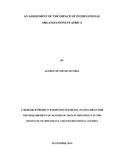| dc.description.abstract | The debate about international organizations rages on. In many fronts scholars and
students of international disciplines hold diverse views on the precise functions of these
organizations. Particularly, opinion is divided on whether these institutions influence
policies, domestic and foreign, of states. Scholars in the realist school of thought feel that
the organizations bear no effect because states are too „guarded‟ and would never cede
substantial powers to a supranational body to give it strong ability to influence, shape or
even enforce policy. On the other hand liberal institutionalists credit international
organizations with the introduction of efficiency through information sharing and
reduction of transactional costs while raising the costs of non-compliance.
Many organizations have set up shop in the third world countries. It is intriguing to note
that these organizations owe their origins elsewhere. They have nonetheless had
extensive operations and interests in the Third World countries. The question that lingers
is; whose interests do the international organizations advance? There have been
assertions that the organizations have contributed greatly to the eroding of economic,
social and political space in the Third World countries. At the same time some have
contended that the organizations have continued to advance imperialistic manners of their
originating countries. The United Nation which has been looked at for provision of
leadership has had its fair share of criticism for its part in pushing for more involvement
of private sector in governance issues, a move seen by many as promoting interests of
transnational capitalists.
Scrutinies of texts commenting on this topic reveal very scant and superficial address of
these issues. Literature on the specific contributions of international organizations and
assessments thereto are few and far between. It is the view of this author that this is an
area that needs urgent redress both from academic and practitioner points of view. This
project endeavors to bridge this gap and seek to prove, disprove and clarify whether
international organizations are a blessing or curse in the Third World countries with a
keen interest in the impacts they have had African states and the African individual. | en_US |

